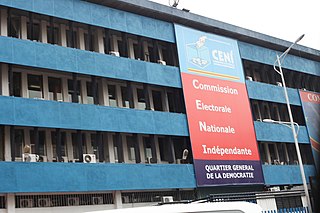
Équateur was one of the eleven provinces of the Democratic Republic of the Congo between 1966 and 2015, when it was split into the new, smaller Équateur province, as well as the Tshuapa, Mongala, Nord-Ubangi and Sud-Ubangi provinces.

Kasai Province is one of the 26 provinces of the Democratic Republic of the Congo. Specified under Article 2 of the country's 2006 Constitution, the new province was finally created in 2015 from the eponymous Kasaï District and the independently administered city of Tshikapa, both part of the former Kasaï-Occidental province.

Kasaï-Central is one of the 26 provinces of the Democratic Republic of the Congo. Specified under Article 2 of the country's 2006 Constitution, the new province was finally created in 2015 from Lulua District and the independently administered city of Kananga, both previously part of the pre-2015 Kasaï-Occidental province. The capital of the province is Kananga.

The 2017 French presidential election was held on 23 April and 7 May 2017. As no candidate won a majority in the first round on 23 April, a run-off was held between the top two candidates, Emmanuel Macron of En Marche! and Marine Le Pen of the National Front (FN), which Macron won by a decisive margin on 7 May. The presidential election was followed by legislative elections to elect members of the National Assembly on 11 and 18 June. Incumbent president François Hollande of the Socialist Party (PS) was eligible to run for a second term, but declared on 1 December 2016 that he would not seek reelection in light of low approval ratings, making him the first incumbent president of the Fifth Republic not to seek re-election.

Presidential elections were held in the Comoros on 7 November 2010, with a second round on 26 December, alongside gubernatorial elections for the three main islands. The result was a victory for Ikililou Dhoinine, who received 61% of the vote.
Pierre Mabiala is a Congolese politician who has served in the government of the Congo-Brazzaville as Minister of Land Affairs since 2017. Previously he was a Deputy in the National Assembly of Congo-Brazzaville from 2002 to 2007, a Senator from 2008 to 2009, Minister of Land Affairs from 2009 to 2016, and Minister of Justice from 2016 to 2017.

The Third constituency for French residents overseas is one of eleven constituencies each electing one representative of French citizens overseas to the French National Assembly.
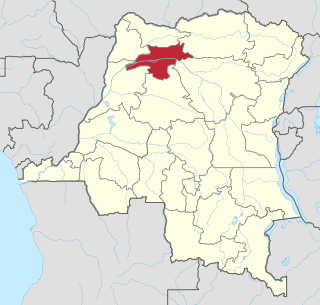
Mongala is one of the 26 provinces of the Democratic Republic of the Congo. Its capital is the town of Lisala.

Elections were held in the Democratic Republic of the Congo for 108 seats of the country's Senate on 14 March 2019. Former DRC President Joseph Kabila, who stepped down from office in January 2019 following the inauguration of the recently elected Félix Tshisekedi, has also joined the upper house of the legislature as a senator for life, for a total of 109 seats.
René-Dambert Ndouane is a Congolese politician who served in the government of Congo-Brazzaville as Minister of Tourism from 1997 to 1999 and as Minister of Labour from 1999 to 2002. He was Second Vice-President of the National Assembly from 2002 to 2007 and First Vice-President of the National Assembly from 2012 to 2017.
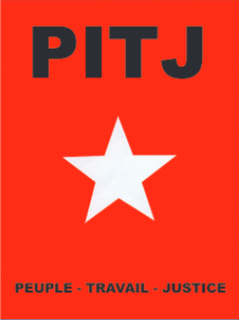
The Party of Independence, Labour and Justice is a political party in Burkina Faso. The veteran trade union leader and former general secretary of the African Independence Party (PAI) Soumane Touré is the chairman of the party.
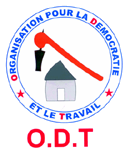
The Organisation for Democracy and Labour is a political party in Burkina Faso. The party supported the government of Blaise Compaoré. As of 2013 Moïse Sawadogo was the chairman of the party. The slogan of the party is 'Democracy - Work - Justice'.

Presidential elections were held in Togo on 25 April 2015. Initially scheduled for 15 April 2015, the election was postponed by ten days at the recommendation of John Dramani Mahama, President of Ghana and acting chair of the ECOWAS organization. Incumbent President Faure Gnassingbé was seeking a third term and was opposed by four other candidates, including the main opposition leader Jean-Pierre Fabre of the National Alliance for Change. Provisional results by the National Independent Election Commission declared Gnassingbé the winner with about 59% of the vote, whilst Fabre received 35%. Fabre called the results a "crime against national sovereignty", saying he considered himself the new president.

The Democratic Rally of the Comoros is a political party in the Comoros led by Mouigni Baraka, Governor of Grande Comore.

Legislative elections were held on 11 and 18 June 2017 to elect the 577 members of the 15th National Assembly of the French Fifth Republic. They followed the two-round presidential election won by Emmanuel Macron. The centrist party he founded in 2016, La République En Marche! (REM), led an alliance with the centrist Democratic Movement (MoDem); together, the two parties won 350 of the 577 seats – a substantial majority – in the National Assembly, including an outright majority of 308 seats for REM. The Socialist Party (PS) was reduced to 30 seats and the Republicans (LR) reduced to 112 seats, and both parties' allies also suffered from a marked drop in support; these were the lowest-ever scores for the centre-left and centre-right in the legislative elections. The movement founded by Jean-Luc Mélenchon, la France Insoumise (FI), secured 17 seats, enough for a group in the National Assembly. Among other major parties, the French Communist Party (PCF) secured ten and the National Front (FN) obtained eight seats. Both rounds of the legislative election were marked by record low turnout.
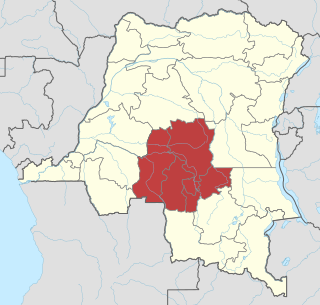
The Kamwina Nsapu rebellion, also spelled Kamuina Nsapu rebellion, is an ongoing rebellion instigated by the Kamwina Nsapu militia against state security forces in the Democratic Republic of the Congo (DRC), in the provinces of Kasaï-Central, Kasaï, Kasai-Oriental, Lomami and Sankuru. The fighting began after the militia, led by Kamwina Nsapu, attacked security forces in August 2016.
The 2019 European Parliament election in France will be held on 26 May 2019, electing members of the 9th French delegation to the European Parliament as part of the European elections held across the European Union. The election will feature two major changes since the 2014 election, with the abolition of regional constituencies and return to national lists in addition to the increase in the number of French seats from 74 to 79 after the withdrawal of the United Kingdom from the European Union.

Dordogne's 4th constituency is one of four French legislative constituencies in the department of Dordogne. It is currently represented by Jacqueline Dubois of La République En Marche! (REM).

Gubernatorial elections took place in 20 out of the 21 provinces of the Democratic Republic of the Congo on 26 March 2016. The elections were the first to take place since the Congolese government has fragmented the former 11 provinces into 26 as mandated by the DRC constitution, though by the time elections occurred only 21 provinces had completed the reform process. In most of the provinces, the elected governors are members or affiliates of the Alliance of the Presidential Majority.
Barthélemy Mukenge Nsumpi Shabantu was a Congolese politician who served as President of Kasai Province from 11 June 1960 to January 1962 and July to September 1962. He was a president of the Association des Lulua-Frères, a Lulua ethnic syndicate, and a leading member of the Union National Congolaise. Though initially allied with nationalist Patrice Lumumba, he later denounced him and aligned himself with more moderate politicians. Following the division of Kasai Province in late 1962, Mukenge became Minister of Health and Minister of Social Affairs of the new Luluabourg Province. He later served as Governor of Kivu Province and on the Political Bureau of the Mouvement Populaire de la Révolution. He withdrew from politics in 1974 and died in 2018.



